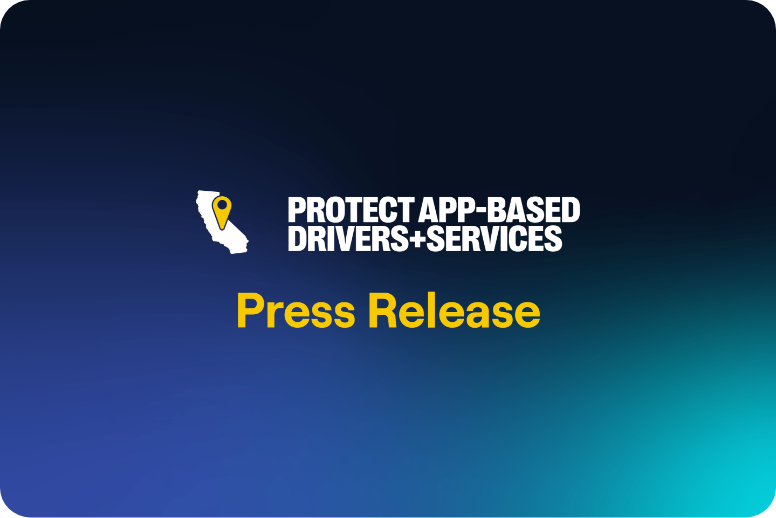Company shut down California subsidiary in May and laid off nearly 600 drivers after it tried employment model
SACRAMENTO — Less than a week from election day drivers supporting Prop 22 are urging voters to support Prop 22 to ensure what happened to drivers who worked for the failed Deliv, doesn’t happen to them.
According to a story in the San Jose Mercury News, “just months after the company changed its business model to cope with controversial state rules regarding independent contractors” Deliv shut down its California operations and laid off nearly 600 drivers after its experiment with an employment model failed.
An independent study from the Berkeley Research Group (BRG) found that an employment model for app-based rideshare and delivery services will have devastating consequences for drivers by eliminating hundreds of thousands of jobs during a recession. Deliv’s drivers were the first app-based drivers to lose their opportunity to earn an income because of an employment model, but if Prop 22 fails to pass, hundreds of thousands of other Californians could lose theirs too.
“Sacramento politicians are claiming we won’t lose our jobs if Prop 22 passes, but I just don’t believe them,” said Bonnie Rolandelli, a delivery driver from Cotati. “Deliv tried employment and it didn’t work. What other proof does anyone need? That’s why we need to pass Prop 22. It will protect drivers and save our jobs.”
From the Mercury News:
Last June, ahead of the pending approval of AB 5… Deliv launched a sweeping change in how it would categorize many of its workers.
Deliv created a subsidiary, Deliv California, that would hire its drivers in California as full-fledged employees of the Deliv unit.
The company expressed confidence that transforming its gig workers into official employees wouldn’t harm its enterprise.
“Deliv’s ability to offer cost-effective same-day delivery is driven by its proprietary technology and unique business model, not the classification of workers,” the company stated last June.
In January, legislative bill AB 5 became a California law, but just a few months later, Deliv began to falter badly.
“Due to a confluence of events over the past few months, Deliv will, unfortunately, be winding down our operations over the next 90 days,” Daphne Carmeli, chief executive officer of Deliv, wrote in an email to employees in early May.
The largest cluster of layoffs affected 591 drivers for Deliv California, according to the notice.
With six days to go until election day, drivers across the state are urging voters to recognize the mistakes of Sacramento politicians and the impacts of an employment model on app-based rideshare and delivery services, and vote Yes on Prop 22.
About Proposition 22
An independent study confirms an employment model would reduce the availability and affordability of rideshare and delivery services in California and eliminate up to 900,000 app-based jobs, a reduction of between 80-90 percent of drivers currently driving today. Without Proposition 22, if an employment model were forced on app-based drivers:
- Rideshare costs would increase for consumers by at least 25.9% and as much as 100% in some markets—meaning that a typical $15 ride across town would cost between $19 and $30;
- Food and grocery delivery costs would increase by at least 35.2% and potentially double in some markets;
- An increase in wait times and a decrease in reliability for customers—meaning an average wait time for rideshare of 7 minutes may double to 14 minutes, and food/grocery delivery of 40 minutes may double to 1 hour and 20 minutes or more; and
- A reduction of the customer base—meaning little or no service to most Californians living in rural or suburban areas of the state.
This will come at the worst possible time, when California is facing high unemployment and when app-based work opportunities will provide a lifeline for people to earn income. In addition, more than 71 percent of app-based drivers want to remain independent contractors, despite efforts by politicians to force them to become employees.
Proposition 22 would ensure driver flexibility, by protecting the ability of California’s one million app-based drivers to choose to work as independent contractors while providing new earning guarantees and benefits. These include:
- Prop 22 improves the quality of app-based work by requiring app-based platforms to provide drivers:
- Guaranteed minimum earnings (120% of California minimum wage) plus compensation toward expenses
- Funding for new health benefits for drivers who work at least 15 hours a week
- Occupational accident insurance to cover injuries and illnesses on the job
- Protection against discrimination and sexual harassment
- Prop 22 implements strong new public safety protections:
- Recurring background checks of drivers
- Mandatory new safety courses for drivers
- Zero tolerance for alcohol and drug offenses
- Making it a crime to impersonate a driver
The Latest News

Press Releases
California Supreme Court Unanimously Upholds Prop 22 in Historic Ruling
Date: July 25, 2024 Contact: Molly Weedn, (415) 209-4217 [email protected] California Supreme Court Unanimously Upholds [...] Read more
Press Releases
PADS Responds to Conclusion of Oral Arguments on Prop 22
Date: May 21, 2024 Contact: Molly Weedn, (415) 209-4217 [email protected] The Coalition to Protect App [...] Read more